Iran Confirms Upcoming Visit By Top EU Nuclear Negotiator
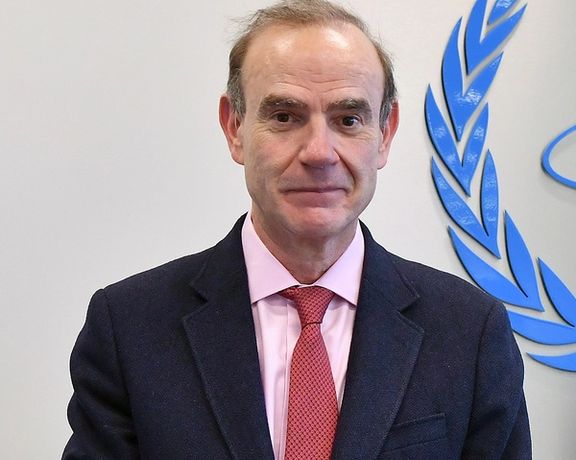
The EU envoy coordinating talks on reviving the Iran nuclear deal, Enrique Mora, will visit Tehran on Thursday, the Iranian foreign ministry has confirmed.

The EU envoy coordinating talks on reviving the Iran nuclear deal, Enrique Mora, will visit Tehran on Thursday, the Iranian foreign ministry has confirmed.
In June, Iran suspended talks with world powers to revive the 2015 nuclear deal and the West has been urging Tehran to return to talks immediately.
"(Mora's) trip will take place on Thursday. It follows consultations between the two sides on issues of mutual interest, including relations between Iran and the Union, Afghanistan and the nuclear accord," ministry spokesman Saeed Khatibzadeh told Iranian state media on Tuesday.
A major concern of Iran in any talks to rescue the 2015 nuclear deal would be around ways to verify the lifting of U.S. sanctions, Foreign Minister Hossein Amir-Abdollahian said on Saturday.
The talks, which aim to bring Washington and Tehran back into compliance with the pact, aimed at curbing the Iranian uranium enrichment program, were adjourned in June after hardline cleric Ebrahim Raisi (Raeesi) was elected Iran's president.
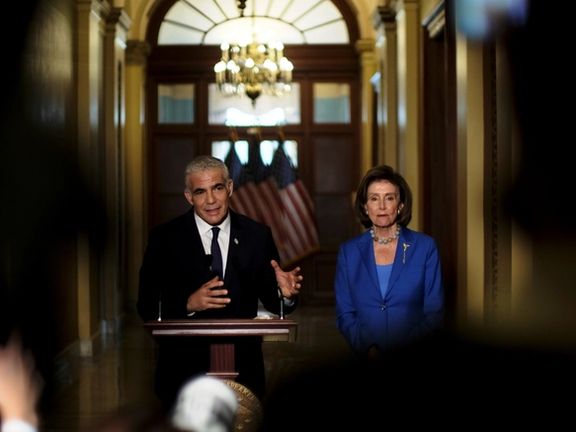
Israel’s Foreign Minister Yair Lapid met with US officials and members of Congress as part of a visit to Washington focused on Iran and its nuclear program.
Lapid’s office released a statement after his meeting with US National Security Advisor Jake Sullivan saying, “the foreign minister shared with the national security advisor Israel’s concerns about Iran’s race toward nuclear capabilities, as well as that Iran is becoming a nuclear threshold state.” The statement went on to stress that “Lapid also discussed with the national security advisor the need for an alternative plan to the nuclear agreement.”
In a separate readout, the spokesperson for the Biden administration’s National Security Council said “the officials also shared their perspectives on the threat posed by Iran. Mr. Sullivan reaffirmed President Biden’s commitment to ensuring that Iran never gets a nuclear weapon. The officials agreed that the United States and Israel will continue to consult closely on Iran and other critical matters impacting the security and stability of the region.”
Lapid also met with US Vice President Kamala Harris, Speaker of the House Nancy Pelosi, and other lawmakers. Harris noted Washington’s and Israel’s “shared concern” over Iran during her meeting with Lapid as well as the rights of Israelis and Palestinians to live in dignity. Lapid revealed that the focus of his visit was the Iranian nuclear program and the need for bipartisan support for Israel.
While in the United States, Lapid is also meeting with US Secretary of State Antony Blinken and will participate in a special trilateral meeting with Blinken and the UAE’s foreign minister, Sheikh Abdullah bin Zayed bin Sultan Al Nahyan on Wednesday.
The three parties will launch two new working groups, a senior State Department official said, as Washington hopes to expand the agreements between Israel and its neighbors known as the Abraham accords.
One working group will focus on religious coexistence and the other on water and energy issues, said the official, who briefed reporters ahead of the meeting on condition of anonymity, Reuters reported.
This visit comes as Israeli officials have become increasingly vocal in their impatience with the stalemate in nuclear negotiations with Iran. They have urged the Biden administration to prepare another package of sanctions as well as undertake military drills in the Middle East as a show of force to pressure Iran to return to the table. Jerusalem has also repeatedly emphasized the need to formulate a Plan B on Iran, should the nuclear negotiations with Tehran fail to salvage the nuclear deal from 2015.

Tuesday’s World Cup qualifier between Iran and South Korea in Tehran was played without fans, thwarting women after earlier notice that they would be admitted.
After the Iranian Football Federation announced Sunday there would be no spectators, a federation official, Hasan Kamranifar, said Monday the decision reflected difficulty in carrying out PCR tests or checking fans had been vaccinated.
The John Hopkins Covid-19 tracker puts the number of deaths from the virus in Iran in the past week at 1,521.
Faezeh Hashemi, daughter of former president Akbar Hashemi Rafsajani, told Ensaf News on Monday that Covid was an excuse. “This is a trick”, she said. “I hope Iranian girls don't give up, go to the stadium gates like they have always done not to lose what is their right.”
Hashemi said she hoped that Fifa, the world governing body for soccer, would not be deceived. In the past few years, Fifa has called on Iran to allow women into stadiums to watch men’s games. In October 2019, the ban on women was lifted for one game, between Iran and Cambodia at the 100,000-capacity Azadi stadium.
On Tuesday, the day of the game, an official of the cinema-owners’ association told the media that some cinemas would show the game live. "Will the PCR test be given to those who go to the cinemas?" the Iranian Students News Agency (ISNA) asked. "Is a football match with 7,000 spectators at Azadi Stadium more dangerous than watching it in closed spaces of cinemas?"
The issue of women watching men’s soccer, where female attendance was restricted after the 1979 Revolution, flared up in 2006, when principlist president Mahmoud Ahmadinejad backed down under pressure from senior Muslim clergy after deciding to let them in.
In recent years, women activists have organized campaigns to gain access to men’s games and some have gone to prison for their protests. In 2019 a 19-year-old fan of Esteghlal FC self-immolated in front of a Tehran court after being told she could face a six-month prison sentence for attempting to enter Azadi stadium disguised as a man. She died in hospital a week later of her injuries.
Hashemi, who from 1990 to 2011 headed the Women's Sports Federation, criticized the state broadcaster (IRIB) for not airing women's sports. "It's disrespect and violation of women's rights," she said, suggesting authorities had a "political and security-oriented view" of women's athletics. "I see no positive prospects for women's sports during [President Ebrahim] Raisi's [Raeesi] presidency," she opined.
The Covid pandemic led to football being played without spectators, but authorities had earlier suggested 7,000 fans could watch the Iran-Korea match provided that they had proof they had received two doses of the Covid vaccine. The game finished in a 1-1 draw, with Iran equalizing late with a header from Alireza Jahanabkhsh to stay top of the group.
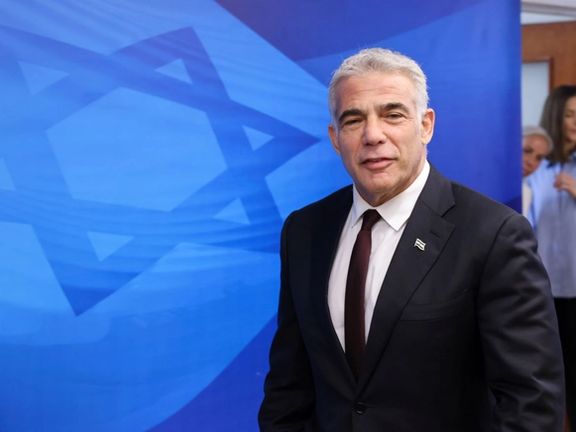
On Tuesday, Israel’s Foreign Minister Yair Lapid met with the US National Security Advisor and is set to meet with others as part of a visit to Washington.
Lapid’s office released a statement after his meeting with US National Security Advisor Jake Sullivan saying, “the foreign minister shared with the national security advisor Israel’s concerns about Iran’s race toward nuclear capabilities, as well as that Iran is becoming a nuclear threshold state.”
The statement went on to stress that “Lapid also discussed with the national security advisor the need for an alternative plan to the nuclear agreement.”
While in the United States, Lapid is also meeting with US Vice President Kamala Harris, US Secretary of State Antony Blinken, Speaker of the House Nancy Pelosi, and other lawmakers. He will also participate in a special trilateral meeting with Blinken and the UAE’s foreign minister.
This visit comes as Israeli officials have become increasingly vocal in their impatience with the stalemate in nuclear negotiations with Iran. They have urged the Biden administration to prepare another package of sanctions as well as undertake military drills in the Middle East as a show of force to pressure Iran to return to the table.
Jerusalem has also repeatedly emphasized the need to formulate a Plan B on Iran, should the nuclear negotiations with Tehran fail to salvage the nuclear deal from 2015.
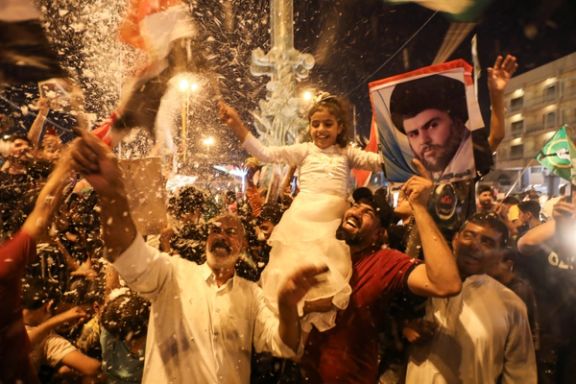
ANALYISIS - Iraqi voters delivered a sharp rebuke to Iran's allies in Sunday's election, but loosening their grip from control of the state will still be a politically delicate goal, with the threat of violence always in the background.
The main winner of the election was Shi'ite cleric Moqtada al-Sadr, a populist who has positioned himself as a staunch opponent of both Iran and the United States.
Sadr proclaimed the result a "victory by the people over ... militias". There was elation among his supporters.
"The most important thing in this election is that foreign countries like Iran didn't interfere in the vote," said Yousef Mohammed, an unemployed 21-year-old in Sadr's vast Baghdad stronghold of Sadr City. "We've been celebrating since last night."
Sadr's bloc, already the biggest in the 329-seat parliament, will expand to 73 seats from 54. Its main rivals for years, the Fatah bloc of factions linked to pro-Tehran militia, meanwhile, saw its parliamentary representation collapse -- to just 14 seats from 48.
An unusually unified Sunni Muslim bloc placed second, giving the minority sect perhaps its strongest leverage since the fall of Saddam Hussein. And even upstart groups of reformists who campaigned against the ruling elite managed to defy predictions that they would be outmaneuvered by established parties: a bloc headed by a pharmacologist emerged with ten seats.
Yet there are still signs that Tehran's grip on the country remains formidable. Most notably, former Prime Minister Nuri al-Maliki, a friend of Iran who campaigned as a champion of law and order, also won big surprise gains, emerging in third place with 37 seats.
A Western diplomat said the leader of Iran's Quds Force, Esmail Ghaani, was in Baghdad while the initial results were released, still seeking a way to keep Tehran's allies in power.
"According to our information, Ghaani was attending a meeting with (Shi’ite militia parties) yesterday. They will do whatever they can to try to organize the biggest bloc - although that will also be very difficult with Sadr's power," the Western diplomat said.
Tehran and Baghdad both publicly denied Ghaani was in Iraq, but two Iranian sources contacted by Reuters confirmed it.
At least one pro-Iran militia commander said the armed groups were prepared to resort to violence if necessary to ensure they do not lose their influence after what they view as a fraudulent election.
"We'll use legal frameworks for now. If unsuccessful we'll have to go to the streets and do the same thing that was done to us during protests - burn party buildings" of the Sadrists, he said.
PROXY BATTLEFIELD
Iraq has been a proxy battlefield for influence between the United States and Iran since the 2003 U.S.-led invasion, which toppled Saddam and created a path to power for a Shi'ite majority led by figures courted for decades by Tehran.
In 2014, when a third of Iraq was captured by fighters from the Sunni Muslim group Islamic State, Washington and Tehran found themselves uneasily on the same side: both providing assistance to Baghdad to fight the militants.
But when Islamic State was defeated in 2017, it was Iran that came out ahead. Factions linked to pro-Iran militias emerged with control over much of the Iraqi state.
That triggered a backlash in 2019, with hundreds of thousands of mainly young Iraqis taking to the streets to protest against corruption, joblessness and foreign influence. Security forces and the militia gunned down 600 of them. A prime minister close to Iran was forced to quit, paving the way for this week's early election.
Sadr, scion of a family of revered clerics including a father and uncle both murdered under Saddam, has emerged as a rare foe of both Washington and Tehran, first leading a Shi'ite uprising against U.S. occupation and later campaigning against Iranian influence.
While he has always held back from playing a leading role in governing coalitions, his followers have quietly secured control of ministries and industries in governments headed by other Shi'ite factions, most with ties to Tehran.
But most of Iraq's Shi'ite political establishment remains suspicious or even hostile to Sadr, including commanders of the security forces who battled his followers in the past. This may have helped Maliki, who as prime minister led a campaign more than a decade ago that successfully wrested southern cities and Baghdad districts from Sadr's followers.
Hamdi Malik, specialist on Iraq's Shi'ite militias at the Washington Institute, said Maliki had spent a lot of money campaigning and appealed to nostalgia among the armed forces, emphasising his own image as a strong leader.
One official from the Badr party, long one of the main pro-Iran factions, said one of the reasons for the poor showing of the militia's Fatah bloc was that supporters shifted their votes to Maliki, viewing him as a more effective bulwark against Sadr.
"Maliki already showed he can stand up to Sadr," the official said.
Analysis by John Davison and Ahmed Rasheed of Reuters
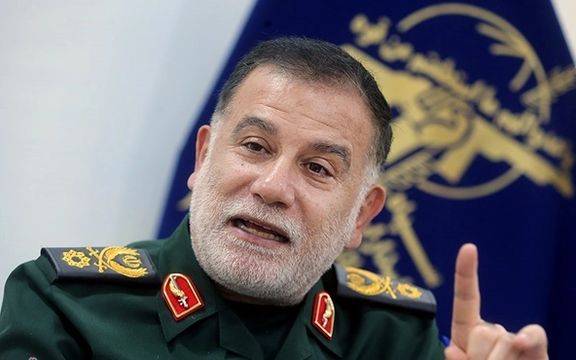
The United States is on the verge of being defeated and expelled form the Middle East, the operations chief of Iran’s Revolutionary Guard has said on Tuesday.
General Abbas Nilforushan told Tasnim news website affiliated with the Islamic Revolution Guard Corps (IRGC) that “there is no American today who is not ashamed of the way US forces escaped from Afghanistan after occupying the country for 20 years.”
This was the result of “accumulated strategic mistakes and lack of a good understanding of cultural factors in the region”, the Iranian commander said, but did not elaborate.
Nilforushan emphasized that geopolitical conditions in the region are changing in favor of the Islamic Republic and its allies, which will lead to a complete pullout of the United States from its current bases.
He also claimed that Israel is on the verge of collapse under the pressure of Iran and its allies.

Tehran has called for the withdrawal of US forces from Iraq after its top Middle East operator, Qasem Soleimani was killed by American drones in January 2020 as he arrived in Baghdad. Iran-backed Shiite militias have been harassing the relatively small number of US forces remaining in Iraq by periodic rocket and drone attacks.
Anti-American rhetoric, particularly by IRGC and its top officers has continued and Nilforushan’s interview with Tasnim is the latest example of attempts to present the US as weak and Iran as victorious after events in Afghanistan.
The IRGC general said he believes the Americans have not given up and will try new ways to compensate. One of these is relying on others to project power and try to save Israel from defeat, but they have lost their levers of power.
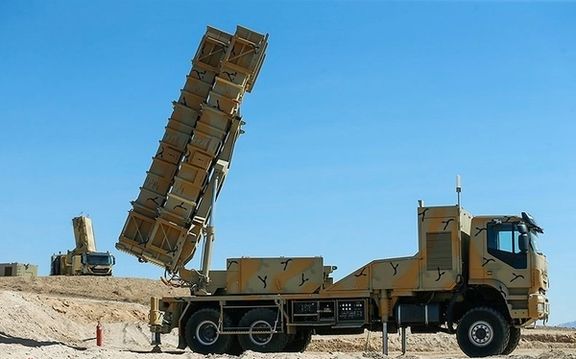
Asked if the US withdrawal from West Asia is a response to China’s growing power or a result of a Democratic administration unwilling to use military force, Nilforushan said US foreign policy has a systemic nature and is not dependent on change of administrations, although they might employ different tactics. He added that if the United States wants to compete with China, “the real theater is the Middle East where the Chinese are gradually filling the economic vacuum” left by Washington.
“It is not correct to say that the Americans are fleeing the region based on a calculated strategy. They are fleeing because of the pressure of the resistance front and their own mistakes,” he said. Regarding US bases in the region, “It is better that the Americans choose the right option instead of being forced to flee like the Afghanistan model,” Nilforushan said.
The emphasis on the notion that the US is fleeing from the region, seems to be a calculated psychological campaign by the IRGC. In fact, the US still maintains its bases in the Persian Gulf, in Iraq and has a presence in Syria, in addition to close military cooperation with allies in the region.
Nilforushan also commented about Israel, saying that the “Zionist regime is completely encircled by the Islamic Republic”, and is trying to confront Iran by other means, but the IRGC has complete knowledge of what the US and Israel are attempting to do.
Several significant sabotage attacks have taken place against Iran’s nuclear, military and strategic targets since July 2020, widely thought to be the work of Israeli intelligence. Nevertheless, Nilforushan said Israel can pose no threat against Iran as its foundations are shaken and it cannot even confront the Gaza strip.
Tasnim quoted the IRGC general as saying, “For Israel’s annihilation there is no need for a military campaign.”